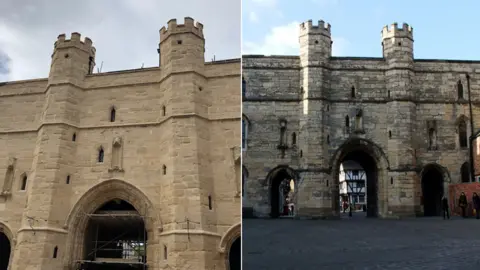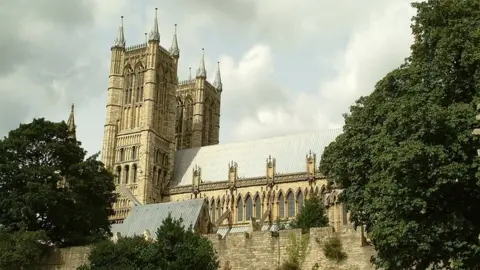Lincoln's revamped Exchequergate Arch 'looks too new'
 BBC/PAUL FARMER Geograph
BBC/PAUL FARMER GeographA 14th Century building which has undergone a major renovation now "looks too new", according to some observers.
The work on Exchequergate Arch in Lincoln's historic quarter is part of a project to improve the city's cathedral and its grounds.
"It looks bland without the centuries of grime," Phil Gresham wrote in his local history group on Facebook.
Cathedral officials said work to remove the "corrosive crust of pollutants" had to be done to ensure the arch survived.
People commented on social media after a tarpaulin covering the building was removed earlier this week.
In response to Mr Gresham's post, other members of the group said the arch looked "too new".
One person said they were worried tourists would think it was fake.
Other comments said it looked like "a new build" or something from a Hollywood movie set.
'Corrosive crust'
Some, however, did welcome the new look.
"Love it," one person wrote.
"Have often wondered what our old buildings would have looked like when they were first built."
Mr Gresham, who has been running the "It's About Lincoln" group since 2012, said he was surprised the post caused such a stir.
Cathedral officials said the building would "look a little bit more natural" after a spell of "significant rain" as it was still covered in dust.
They said it was the first time the arch had undergone work since the late-1800s.
"The cleaning has removed a corrosive crust of pollutants, which mostly accumulated post-industrial revolution," a spokesperson said.
"This was actively damaging the stonework of the arch, and if left it would have continued to deteriorate, creating the risk of stone falling from it."
"Over the next couple of years the stonework will weather and blend in more with the rest of the buildings," they added.

Exchequergate Arch was originally built during King Edward I's reign to protect the area surrounding the church of St Mary Magdalene.
It is the only triple-arched gateway leading into cathedral grounds in the country and possibly Europe, according to officials.

Follow BBC East Yorkshire and Lincolnshire on Facebook, Twitter, and Instagram. Send your story ideas to [email protected].
